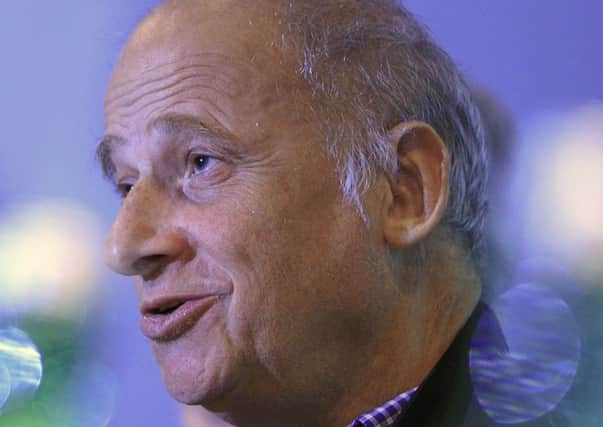Obituary: Luc Bondy, opera and theatre director


Scotland saw more of the work of the director Luc Bondy than anywhere else in the UK – he specialised in producing large scale works in major opera houses and the state theatres in Germany. He had a vivid ability to stage grand works with total authority. In rehearsal he gave the impression of encouraging improvisation but, in truth, Bondy had a clear and distinct idea of how a production would appear. Colleagues remember him as a cultivated, well-mannered, gentle and witty man.
His visits to the Edinburgh Festival were all on a typically epic scale: as was a celebrated collaboration for Scottish Opera’s Macbeth in 1999. The Festival productions in the mid-1990s demonstrated Bondy’s vision, stage-craft and ability to realise grand tableaux on stage.
Advertisement
Hide AdAdvertisement
Hide AdBondy made a major impact on the Scottish art scene in 2000 when he agreed to direct Macbeth for SO. It was a tremendous coup for the company and especially for Sir Richard Armstrong the musical director. Sir Brian McMaster the Festival’s director knew Bondy and approached the director in Vienna about directing Macbeth in Scotland. “He was interested” Sir Brian has recalled.
The production gave SO a high European profile and the company was the envy of many other Houses. The production opened in Vienna which was a first for SO. It cannot be ignored that the vast scale of the production caused lasting financial problems at SO but no one can doubt the brilliance of Bondy’s direction: its political overtones with the King as a weakling and Lady Macbeth given a terrible strength. One critic called it “wrenchingly moving.”
His other Festival visits were no less outstanding. In 1994 Bondy staged Peter Handke’s The Hour We Knew Nothing of Each Other. It had a cast of 33 playing 400 roles. Sheila Colvin, former associate director of the EIF, remembers the evening with much affection. As she told The Scotsman yesterday, “Weird indeed, but so wonderful. I returned my tickets for some other Festival event so I could see it again. It was absolutely extraordinary. And the whole point of it was that there was no dialogue. Just all those people, to-ing and fro-ing across and around the stage, interacting or simply passing another by, some rushing, some loitering, lingering.”
Catherine Lockerbie, reviewing the production in The Scotsman, agreed. “Bondy directs with consummate delicacy of touch and fluid discipline…the pacing feels inborn. There may be no speech but, oh, what elegance.”
In 1998 his “mighty” production of Verdi’s Don Carlos was given by the Royal Opera with a cast led by Julian Gavin and Karita Mattila. In fact when the soprano made her dramatic exit at the end of act one on the magnificent white stallion, the horse invariably misbehaved. But the production was the sensation of the Festival.
Bondy brought the famous Burgtheater in 2001 presenting Chekov’s The Seagull with Jutta Lampe: one Edinburgh critic wrote that Bondi’s production was “a combination of psychological truthfulness and dreamlike enchantment with an unforgettable emotional intensity.”
In 2002 his production for the Aix-en-Provence Festival came to Edinburgh under Daniel Harding. The ghostliness of the opera was reflected in Bondy’s marked simplicity which brought an essential intensity to the drama.
Luc Bondy was born to an intellectual family and educated at a boarding school in the Pyrenees. In 1966 he studied in Paris then got theatre work in Germany, rapidly gaining a reputation for adventurous theatre productions. He also directed at Patrice Chereau’s famous theatre at Nanterre. Such was the imagination and invention he brought to his theatre productions he was asked to direct Mozart’s Cosi fan tutte at the Theatre de la Monnaie in Brussels. That theatre’s former artistic director, Valerio Tura, commented yesterday on Bondy’s early death, “We have lost one of the greatest and most genuine stage directors of the last decades: a true innovator, but never, ever gratuitously provocative.”
Advertisement
Hide AdAdvertisement
Hide AdHis opera productions were seen in all the major opera houses of the world: apart from Don Carlos, Covent Garden also mounted Salome (1992). In 2009 Bondy was invited to do a new Tosca at the Metropolitan in New York – replacing a classic Zeffirelli production. The audience roundly booed the production and Bondy memorably quipped, “I am scandalised that they are scandalised”.
From an early age Bondy had to cope with the ravages of cancer. Not only did he show immense courage but he refused to disguise the illness. “Why hide? When you’re bald at 25 it normalises things,” he said. He refused to have his life disrupted by the disease and once bravely carried on rehearsing at the Paris Opéra from a bed by the stage.
Other arts appointments included the direction of both the Salzburg and the Vienna Festivals. Bondy was a man devoted to the theatre and had a command of visualising how scenes would come over the footlights. All his productions were true to the author or composer’s wishes and avoided gimmickry or banal jokes. He was a man of total artistic integrity.
But for many, despite its fierce financial repercussions, many will remember SO’s Macbeth with awe and admiration. Sir Richard Armstrong, then musical director of SO, has written, “Luc loved the idea of doing Macbeth in Scotland. Working with him was astounding. He had a phenomenally fertile imagination.”